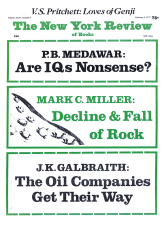In response to:
Faust: Still Striving and Straying from the November 25, 1976 issue
To the Editors:
Reading Professor Levin’s article on Faust as treated by Jarrell, Macneice, and Lowell in your November 25 issue, and its digressions on my English Faust with Cyrus Hamlin’s apparatus, I was a little stung in a few places; not so much by the rather airy tone of these asides (…ingenious, but smells of the thesaurus…he is a foreigner, poor fella, so he tries too hard…) but by the vast lacuna which mutely testifies to the fact that the frame of his discussion was set by the poets who were bemused by Faust, not by the work itself and its right to come into English as it was and is. After noting that Faust I cannot be understood or sensibly discussed outside the framework of Faust I-and-II (a truth which I did not recognize until I had completed Part I five years ago), he allows his interest in the two and a half poets-without-enough-German, who omitted or neglected Part II and rode roughshod over the prosodic surface of Faust I, to dominate his essay to the degree that no illustrative excerpts of Faust II are shown at all, let alone comparative samples. Two-thirds of the questing and challenging world drama, and of the work Cyrus Hamlin and I did to bring it into English life in Goethe’s forms (not anyone’s patronizing “idioms”) might as well not exist.
Another gratuitous little touch I bridle at, and which might have been spared me by a simple enquiry beforehand, is the repeated suggestion, now veiled, now couched in terms of genial approval, that I cribbed from Macneice. For one thing, I know that no truly bilingual poet translating a work of poetry, or any sort of verse translator of rank, would operate this way. (The “cumulative” way Professor Levin posits applies to creative decipherment or scriptural hermeneutics as practiced, say, on a table of hieroglyphic Hittite.) He does not operate this way in part from a fear that his own poetic rapport and impetus might suffer; in part, I suppose, because he might miss a chance for a trouvaille; lastly, and most importantly, because it was the pity and terror inspired by existing versions (all, in varying degrees) which drew him into the not inconsiderable undertaking in the first place. In the manner of the examiners in Kortum’s Jobsiade, after receiving one or two answers in each version, “auf diese Antwort des Kandidaten Jobses / Geschah ein allgemeines Schütteln des Kopses.”
That Macneice and I come out only twice with identical equivalents for lines as lapidary as Mein Herz ist schwer, where the first-cousinship between English and German cries out to be used anyway, is a pity; one of us could not have been on his toes in terms of comparative etymosemantics. As to mutual influence, it makes hardly a fly’s weight to the 5,000-odd lines where we have a chance to differ and do, or the 5,000-odd which Macneice did not translate. A piquant sidedish here, in fact, one of those tidbits of utterly forgettable subliterary Entstehungs-geschichte which there is every reason for Professor Levin not to know, is that Louis Macneice could have been cumulating on my version, not vice versa. The Gretchen song and monologues, the “Shepherd” ditty, and parts of the Prologue in Heaven were the only portions of Faust I had translated in the Thirties; some twenty years before Macneice, some thirty years before I, had any idea of translating the whole drama. I knew Macneice slightly then; but these bits were done for, and distributed to, some members of the Oxford English Club, some of whom were in much closer touch with the then-reigning foursome, Auden, Spender, Isher-wood, Macneice. I don’t for a moment think that LM ever had more than a glimpse of these sheets, which also had Mickiewicz, Tuwim, Rilke, and Hofmannsthal on them. I am certain he did not cumulate; nor did I.
Walter Arndt
Dartmouth College
Hanover, New Hampshire
Harry Levin replies:
I am sorry that my sincere and respectful effort to give Professor Arndt’s translation its due has met with so Nabokovian a response. That he is not a poet, after all, is not his fault.
This Issue
February 3, 1977



